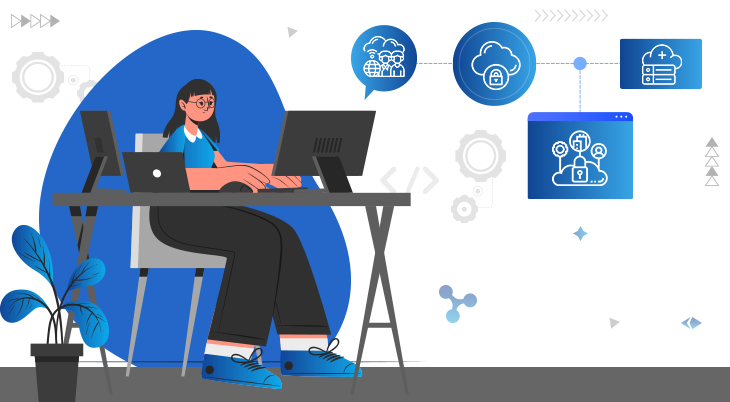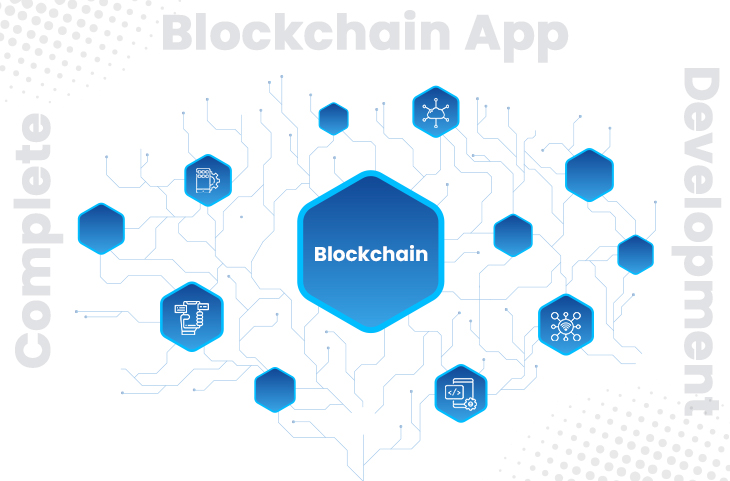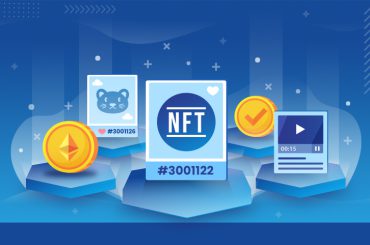It’s been quite a long time since Blockchain is the hottest topic in the tech universe, and there’s no trace of getting it slowed down. It is still one of the most talked-about topics around. Today, the use of Blockchain technology and the demand of blockchain app development company is inevitable. Many sectors like finance, banking, health, real estate, entertainment media, government depend on this hot topic. Its unignored dependency is attracting everybody to invest in blockchain applications.
If you’re a tech enthusiast considering a blockchain investment, you should know the whole blockchain development process. In this guide, we’ll go in-depth about all the technical aspects of Blockchain Technology and how you may incorporate it into your business operations.
What is Blockchain Technology?
A distributed ledger is what a blockchain is. DLT (distributed ledger technology) permits records to be kept on several computers or “nodes.”
A node may be any blockchain user, but it requires a lot of computer power to run. Within the ledger, nodes check, authorize, and store data. Traditional record-keeping systems, which store data in a central location, such as a computer server, are not applicable.
Untrusted parties can agree on a shared digital history using blockchain technology. Because digital assets and transactions may be readily counterfeit or reproduced, having a shared digital history is essential. Without the use of a trusted middleman, blockchain technology eliminates this problem.
Benefits of Blockchain
Blockchain has helped many big giants to achieve greater heights. Here are the top benefits of revolutionizing Blockchain Technology.
Trust and Transparency
Where trust is either non-existent or untested, blockchain generates trust among multiple entities. As a result, these businesses are willing to participate in transactions or data sharing that they may not have done otherwise or that would have required the use of an intermediary.
The usage of blockchain technology is making transaction histories more transparent. Only by agreement can that shared version be modified, which means everyone must agree on it. To amend a single transaction, one has to change all future records, and the whole network would have to agree.
Enhanced Security
Improved and enhanced security is among the best benefits of Blockchain Technology. Your information is sensitive and vital, and blockchain has the potential to drastically alter it and could add safety to it. Blockchain helps prevent fraud and unlawful behavior by producing a record that can’t be changed and is encrypted end-to-end. Because data is kept over a network of computers rather than on a single server, hackers have a tough time accessing it.
Efficiency and Speed
Blockchain can handle transactions substantially quicker than traditional techniques since it eliminates intermediaries and replaces remaining human procedures in transactions. However, the speed with which a blockchain-based system can execute transactions is dependent on several factors, including the size of each block of data and network traffic. Walmart uses blockchain technology to trace the origins of sliced mangoes in seconds, a procedure that had previously taken seven days.
Types of Blockchain Technology

Blockchain has three major types listed below –
Public Blockchain
There are no limits on a public blockchain. In any case, this network validates transactions using Proof of Work or Proof of Stake consensus techniques. In the truest sense, it is a “public” network.
It’s an open-source platform built on the Power of Work and Stake consensus algorithms. It is a reliable, transparent, and secure platform that everyone can examine, and anybody may participate as a developer or a user.
Private Blockchain
Private blockchain solutions aid in the strengthening of these programs for a company’s internal networking system. Businesses that create a private blockchain do it on an authorized network.
This limits who is authorized to engage in the network and just for specific transactions.
To participate, participants must first get an invitation or authorization.
Existing participants might decide on prospective entrants; a regulatory authority could issue participation licenses, or a consortium could make the choices instead.
Hybrid/Federated Blockchain
The hybrid blockchain architecture differs from other blockchain architectures in that it is not available to everyone but still provides blockchain benefits such as integrity, transparency, and security.
Hybrid blockchain architecture, like any blockchain architecture, is completely customizable. Members of the hybrid blockchain may choose who can join the blockchain and which transactions are made public. It combines the best of both worlds and guarantees that a firm can work effectively with its stakeholders.
Blockchain Development Platforms
Blockchain has revolutionized the way we see technology. There is 20+ Blockchain development process of blockchain app development. Here is the list of the best and most used platforms DLT for development.
1. Ethereum
Ethereum is one of the oldest platforms and widely used blockchain platforms around the globe.
A smart contract is a computer program with functions and states. Each smart contract executes on the Ethereum blockchain at a specified address. Contracts may send transactions and have balances since they are independent accounts on Ethereum.
The Ethereum Virtual Machine is another fantastic feature of Ethereum (EVM). In EVM, the virtual machine is a computer that runs Ethereum accounts and smart contracts.
2. EOSIO
Launched in 2018, EOSIO is an open-source blockchain platform. It is a highly performant, reliable, and secure platform for blockchain app development. C++ is the base of EOSIO smart contracts. It may not be the most popular, but its high efficiency and compatibility are selling points.
3. Hyperledger Sawtooth
Hyperledger Sawtooth is a Hyperledger Hub-developed modular blockchain technology for building DLT applications and networks. The Linux Foundation started Hyperledger Sawtooth, and IBM and Digital Assets are now maintaining it.
Businesses use Hyperledger Sawtooth to create scalable and reliable systems with highly secure blockchain solutions. Hyperledger Sawtooth features a permission ledger type, similar to Fabric and Ethereum.
4. IOTA
It’s based on distributed ledger technology (DLT) open-source solution for offering quicker and more secure payment services between linked IoT devices. This platform leverages directed acyclic graph (DAG) technology. It has unique features such as free transactions regardless of transaction size, speedier confirmation times, and the ability to handle an infinite number of transactions at once, making it an excellent platform for developing payment systems.
5. Corda
The R3 Consortium created Corda, an open-source blockchain technology, in 2015. Corda was created with financial institutions in mind, but it has subsequently expanded to include healthcare, insurance, digital assets, and finance. “The DLT platform of choice for financial services and beyond,” the next-generation blockchain architecture claims. Corda supports smart contracts and has a permission ledger type so you can build and deploy smart contracts on the Corda blockchain. Java or Kotlin is the base of Smart contracts in Corda. 
Best Blockchain tool to use
While developing, it is crucial to know about the best Blockchain tools. Let’s dive into the list of top Blockchain tools.
1. Geth
Geth is one of the first names that comes to mind when thinking about the best blockchain tools accessible right now. It’s essentially an Ethereum node in the Go programming language. Geth comes with three different user interfaces: interactive console, JSON-RPC server, and command line.
Geth is the first choice to develop blockchains on Linux, Windows, and Mac computers. It’s an excellent tool for a variety of Ethereum Blockchain operations, including smart contract generation, token transfer, block history exploration, and ether token mining. Users can connect to current blockchains or create their own after installing Geth.
2. Solidity
To create Ethereum-based smart contracts and apps, developers use an object-oriented programming language, Solidity. It has a script that is comparable to JavaScript and improves the Ethereum Virtual Machine. In Ethereum, it refers to the runtime environment. On any blockchain, to create and implement smart contracts, developers seek Solidity.
3. Mist
Ethereum’s developers created Mist, an official Ethereum wallet. It is particularly useful for implementing smart contracts. It is a full-node wallet for storing Ether tokens. To get the full potential, one needs to download the whole Ethereum Blockchain, more than one Terabyte.
4. Solium
Security is critical in the development of each tool. The solidity code must be safe and impenetrable to tampering. It aids with the formatting of solidity codes and the resolution of any security vulnerabilities that exist in the code. Solium is a tool to check for code vulnerabilities, and it supports coding methods that the community has agreed upon.
5. Truffle
Truffle is a well-known rival among the top blockchain tools. It is an Ethereum blockchain framework designed to create a development environment for the creation of Ethereum-based applications. Truffle also contains a large library of custom deployments that aid in the development of new smart contracts and the resolution of blockchain development difficulties. Truffle is also well-suited to the creation of complicated Ethereum decentralized apps. Automated contract testing is another salient feature of Truffle as a blockchain tool.
6. Metamask
Cryptocurrencies play a vital role in the adoption of blockchain technology. As a result, wallets are among the greatest blockchain tools, and Metamask provides certain unique features. It acts as a bridge between a browser and the Ethereum blockchain. Metamask allows you to engage with Ethereum decentralized apps at the same time. It’s vital to note that users may utilize Metamask to sell and acquire ERC20 tokens and ETH by connecting Coinbase and Shapeshift.
Factors Affecting the Cost in Blockchain App Development
Every blockchain app development company follows a different process to create a blockchain app, and thus the cost also differs from company to company. Here are the deciding factors affecting the development of a Blockchain app.
1. The Industry
The first and foremost thing to keep in mind is the industry for which the app will serve. The intricacy of the dApp, the number of stakeholders who would engage with the app at any given time, and, among other things, industry compliance regulations have all influenced expenses.
2. Project Complexity
When it comes to defining the complexity of a Blockchain mobile application, there are a lot of elements to take into account. The first thing you should think about is the app’s purpose. You should have a good understanding of the issues that end-users face, the present solutions, the necessity to invest in building blockchain apps, and how your app can deliver superior services. All of this will assist you in determining the sort of blockchain application or solution in which you should invest. Top Blockchain Development Companies use some considerations to make the development process easier and cost-efficient.
- The Platform Used
- Code Stack
- APIs
- UI/UX
- MVP
In short, these are the technical aspect big enterprises use. But the foremost thing to consider is knowing the purpose of the app. Besides the complexity, the development costs also depend on personnel, equipment, and technology.
3. Cost of People Involved
The process of app development is big, and it requires many hands to develop. What resources do you require to create an application? The cost of engaging a blockchain app development company is a big part of the total cost estimate.
4. Maintenance Cost
Each developer should write and evaluate code in a shared code repository to ensure, it works flawlessly with everyone else’s code. It’s crucial to maintain a high-quality software pipeline. The easiest approach to check this is through an automated procedure.
Blockchain technology is still in its infancy and is relatively new to the industry, with new platforms appearing daily. As a result, alternative systems should be switched only based on the scalability, flexibility, and secrecy of the same.
5. Cost of Development
The process of developing a blockchain app necessitates the knowledge and services of Top Blockchain App Development Companies. This operation might take three to four months or perhaps longer to finish. It may be done in many ways, and the cost of app development varies based on several criteria. Along with the development time, several other elements influence the cost. These include stages of development, app platforms, difficulties, construction procedures, technologies, and upkeep, among others. Taking all of these things into account, the cost of developing a Blockchain app may vary drastically, including cutting-edge features and cutting-edge technology and tools.
Implementation of Blockchain in Different Organizations
Before developing and discussing further, it is important to know about blockchain implementation in industries.
-
Integrating Cryptocurrency Transaction
Blockchain technology, which is at the heart of Bitcoin and other cryptocurrencies, is poised to revolutionize commerce. The lack of intermediaries will not only speed up the procedure but will also make it easier to transfer funds safely at a reasonable cost. Many businesses, especially those that provide discreet services, are seeing significant benefits from enabling clients to pay in cryptocurrency. Cryptocurrencies are typically a much-welcomed means of payment because most consumers don’t want such purchases to display on their monthly credit card bills.
-
Distributed Cloud Storage
The blockchain cloud storage system divides users’ data into little parts. It then adds another layer of protection and disseminates it over the network. The hashing algorithm, public/private key encryption, and transaction ledgers are all characteristics of the blockchain that make this feasible. Each piece of information is kept in a separate area. Another advantage is that because the node does not save the owner’s data, the owner remains anonymous. The miner only receives a small portion of the data and all sensitive data is kept safe.
-
Blockchain as Notary Services
The most typical application of blockchain in notarization involves two steps: hashing the document and putting it on the blockchain. Making the most of the limited space on the blockchain while controlling prices and data privacy is more realistic. Users may trust the integrity of data on the chain using this technique. The well-known qualities of blockchain already position it as a valuable tool for enhancing notary capabilities. Different services on the open market provide discrete blockchain implementations.
-
Blockchain in ID Protection
Some claim that blockchain technology might eliminate the need for intermediaries and give individuals complete control over their digital identities, while others argue that firms can continue to process personal data while using blockchain technology to access it.
-
Blockchain in Supply Chain
Suppliers, manufacturers, distributors, retailers, auditors, and consumers are part of supply chains. The IT infrastructure of a blockchain would streamline operations for all participants, regardless of the size of the business network. A unified infrastructure would also provide auditors with a better view of participants’ activities across the value chain.
-
Blockchain for Governement
Governments will most likely start deploying distributed ledger technology (DLT) systems to replace existing paper-based systems. The transition to digital data systems has been ongoing for some time. DLT offers higher trust, transparency, and security through encryption and validation capabilities.
Future of Blockchain
In recent years we have seen blockchain technology has a lot of promise, and it’s growing all the time. Furthermore, the future of blockchain technology is bright, and given that it is already shown potential in nearly every field, it appears that the best is yet to come.
Meanwhile, it will be intriguing to watch where blockchain technology goes in the future, particularly in terms of money transfers, financial services, decentralized markets, and other areas. It has, however, effectively avoided all of the unfavorable assumptions to arrive at a positive condition with blockchain implementations in a variety of use cases. Blockchain technology’s prospects are strongly reliant on innovation and might provide significant value to businesses. Many big giants are looking at new methods to exploit blockchain in the future.
Final Words
The need for Blockchain is steadily increasing, and it will soon support an incredible number of systems, even though most people have no idea how it works. Blockchain implementation necessitates a variety of changes, which may make it difficult to operate with. Make sure your user interface is basic enough for your customers to understand and economical. Without a doubt, regardless of any blockchain implementation issues, we are confident that this article will substantially assist you in accomplishing your goal in the blockchain industry.
Blockchain technology offers a fresh perspective on how we come to agreements. Without the need for a mediator, several untrustworthy parties may produce and agree on a single source of truth for the first time. As a result, the technology’s consequences for conventional intermediaries and corporate actors might be substantial.





